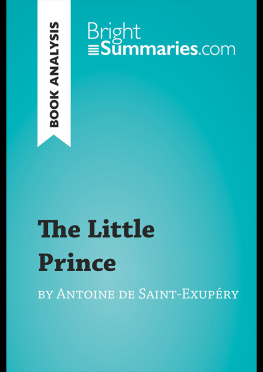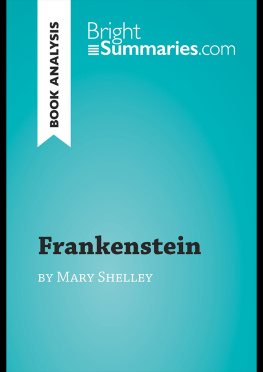Bright Summaries - Book Analysis: Hamlet by William Shakespeare: Summary, Analysis and Reading Guide
Here you can read online Bright Summaries - Book Analysis: Hamlet by William Shakespeare: Summary, Analysis and Reading Guide full text of the book (entire story) in english for free. Download pdf and epub, get meaning, cover and reviews about this ebook. year: 2016;2015, publisher: BrightSummaries.com;Primento Digital, genre: Children. Description of the work, (preface) as well as reviews are available. Best literature library LitArk.com created for fans of good reading and offers a wide selection of genres:
Romance novel
Science fiction
Adventure
Detective
Science
History
Home and family
Prose
Art
Politics
Computer
Non-fiction
Religion
Business
Children
Humor
Choose a favorite category and find really read worthwhile books. Enjoy immersion in the world of imagination, feel the emotions of the characters or learn something new for yourself, make an fascinating discovery.
- Book:Book Analysis: Hamlet by William Shakespeare: Summary, Analysis and Reading Guide
- Author:
- Publisher:BrightSummaries.com;Primento Digital
- Genre:
- Year:2016;2015
- Rating:4 / 5
- Favourites:Add to favourites
- Your mark:
- 80
- 1
- 2
- 3
- 4
- 5
Book Analysis: Hamlet by William Shakespeare: Summary, Analysis and Reading Guide: summary, description and annotation
We offer to read an annotation, description, summary or preface (depends on what the author of the book "Book Analysis: Hamlet by William Shakespeare: Summary, Analysis and Reading Guide" wrote himself). If you haven't found the necessary information about the book — write in the comments, we will try to find it.
Bright Summaries: author's other books
Who wrote Book Analysis: Hamlet by William Shakespeare: Summary, Analysis and Reading Guide? Find out the surname, the name of the author of the book and a list of all author's works by series.
Book Analysis: Hamlet by William Shakespeare: Summary, Analysis and Reading Guide — read online for free the complete book (whole text) full work
Below is the text of the book, divided by pages. System saving the place of the last page read, allows you to conveniently read the book "Book Analysis: Hamlet by William Shakespeare: Summary, Analysis and Reading Guide" online for free, without having to search again every time where you left off. Put a bookmark, and you can go to the page where you finished reading at any time.
Font size:
Interval:
Bookmark:



- Born in Stratford-upon-Avon in 1564
- Died in 1616
- Notable works:
- A Midsummer Nights Dream (1592-1595), comedy
- Richard III (1592-1595), historical play
- Hamlet (1595-1600), tragedy
A poet and playwright, and a prominent English literary figure, particularly in the genre of Elizabethan theater (named after Queen Elizabeth I, 1558-1603), William Shakespeare was born in 1564. There has been some occasional doubt over his historical existence, which now seems proven, although some periods of his life remain mysterious. He wrote 37 plays, all of which generally fall into one of four categories: historical plays such as Richard III , comedies such as A Midsummer Nights Dream , great tragedies such as Hamlet and, finally, the last plays, which include those such as The Tempest . During the 1600s, the theater company of this actor and writer, considered one of the best in London, became resident at the Globe Theatre. William Shakespeare died in 1616.
- Genre: play (tragedy)
- Reference edition: Shakespeare, W. (2007) Hamlet . Shakespeare Library Classic. Minneapolis: Filiquarian Publishing, LLC.
- First edition: 1601
- Themes: death, madness, treason, lies, revenge
Hamlet is one of Shakespeares most famous tragedies. The play was written between 1595 and 1600.
The eponymous hero, the Prince of Denmark, lost his father, the king, two months ago. His mother is remarried to the new king, Claudius, the brother of the former king. Hamlet does not accept this as he considers it to be treason. When he discovers that his father was actually murdered by Claudius, he seems to sink slowly into madness.
Act I
The scene takes place in Elseneur, Denmark. Officers on duty at the kings castle see a ghost. It had already appeared to them the previous night. The ghost resembles the former king in every way. Horatio says, In what particular thought to work I know not; But in the gross and scope of my opinion; This bodes some strange eruption to our state (Act I, Scene I). The officers carry out an inspection round because the country fears an attack: Fortinbras of Norway provoked the king of Denmark, before being killed by Hamlet. According to previous agreement, his lands were supposed to be given to Hamlet, but the son of Fortinbras shark'd up a list of lawless resolutes, for food and diet (Act I, Scene I) to reclaim them.
After the kings death, his brother Claudius succeeded him and married his wife, Gertrude. Hamlet, the son of the former king and Claudius nephew, is very melancholy since the death of his father. He blames his mother for re-marrying so soon, just two months after her husbands death, and to a man who is not as worthy as his father. Horatio tells Hamlet that he saw a ghost and the prince decides to go to the platform at night to try and see it for himself.
Laertes, son of the chamberlain Polonius, is preparing to leave for France and says goodbye to his sister, Ophelia. She tells him that Hamlet appears to have feelings for her. He warns her to take heed: He may not, as unvalued persons do, carve for himself; for on his choice depends the safety and health of this whole state (Act I, Scene III). Polonius confirms this advice and tells his daughter to distance herself from Hamlet, who is only using her: Do not believe his vows (Act I, Scene III).
That night, Hamlet is on the platform accompanied by Horatio and Marcellus and he sees the ghost, who asks Hamlet to follow him. The ghost is his father and tells him that he was murdered by Claudius: But know, thou noble youth, the serpent that did sting thy father's life now wears his crown (Act I, Scene V). He was poisoned. Horatio and Marcellus swear to never reveal what they saw that night.
Act II
Polonius asks his servant, Reynaldo, to investigate his son, Laertes. Ophelia tells her father, frightened, that Hamlet visited her, disheveled and acting strangely. Polonius believes that he is mad. The king asks Hamlets friends, Rosencrantz and Guildenstern, to spend some time with him and try to understand what is going on : Something have you heard of Hamlet's transformation; so call it, sith nor the exterior nor the inward man resembles that it was (Act II, Scene II). The ambassadors of Norway inform Claudius that the King of Norway has arrested Fortinbras. Polonius enters and tells Claudius and Gertrude that he believes Hamlet to be crazy and, as proof, reads them a letter that he sent to Ophelia.
Guildenstern and Rosencrantz go to find Hamlet. He expresses his melancholy to them: I have of latebut wherefore I know not--lost all my mirth, forgone all custom of exercises; and indeed it goes so heavily with my disposition that this goodly frame, the earth, seems to me a sterile promontory (Act II, Scene II). Actors are in town and Hamlet wishes to see them. He asks them to act out the story of Priams death, told by Aeneas to Dido, then he requests another show for the following day: he wants to see them play The Murder of Gonzago and adds to the play an apostrophe that he wrote himself. Hamlet thinks to himself: I'll have these players play something like the murder of my father before mine uncle: I'll observe his looks; I'll tent him to the quick: if he but blench, I know my course. (Act II, Scene II).
Act III
Guildenstern and Rosencrantz relate their meeting with Hamlet to the king and queen, who then hide in order to spy on Hamlet and Ophelia. Hamlet tells the young woman that she should not have believed him and that he does not love her. He shall with speed to England, for the demand of our neglected tribute haply the seas and countries different with variable objects shall expel
this something-settled matter in his heart, whereon his brains still beating puts him thus from fashion of himself declares the king (Act III, Scene I).
Hamlet asks Horatio to observe the king during the performance of the play. Claudius reacts to the poisoning scene. Hamlet takes this as confirmation of the ghosts claims. Hamlet goes to speak to his mother while Polonius is hidden behind a tapestry in order to spy on them. When Polonius moves, Hamlet stabs him through the tapestry, saying: How now! a rat? (Act III, Scene IV). Hamlet accuses his mother of having betrayed his father. The ghost appears, but his mother cannot see it.
Act IV
The queen tells Claudius what has happened. She says that Hamlet must leave immediately for England. During his journey, Hamlet meets Fortinbras troops marching to Poland and laments his own cowardice.
Ophelia becomes mad. Laertes has returned. The king suggests that Laertes ensures he crosses swords with Hamlet in order to avenge his father and sister by killing him with a non-speckled sword. Laertes decides to also poison the blade. As a precaution, the king also prepares a poisoned drink. Horatio receives a letter from Hamlet who asks him to join him. The queen announces that Ophelia has drowned herself.
Act V
The clowns dig a grave for Ophelia. They discuss the drowning and the question of suicide, which is condemned by the Church. Hamlet observes them and is surprised by the nonchalance with which the gravedigger throws skulls into the air. Why may not that be the skull of a lawyer? Where be his quiddities now, his quillets, his cases, his tenures, and his tricks? he asks. The king, queen and their entourage carry Ophelias body. Hamlet discovers that she has died. Shocked by Laertes manifestation of pain, which he finds extravagant and false, he provokes him by saying that he loved Ophelia more.
Font size:
Interval:
Bookmark:
Similar books «Book Analysis: Hamlet by William Shakespeare: Summary, Analysis and Reading Guide»
Look at similar books to Book Analysis: Hamlet by William Shakespeare: Summary, Analysis and Reading Guide. We have selected literature similar in name and meaning in the hope of providing readers with more options to find new, interesting, not yet read works.
Discussion, reviews of the book Book Analysis: Hamlet by William Shakespeare: Summary, Analysis and Reading Guide and just readers' own opinions. Leave your comments, write what you think about the work, its meaning or the main characters. Specify what exactly you liked and what you didn't like, and why you think so.

















